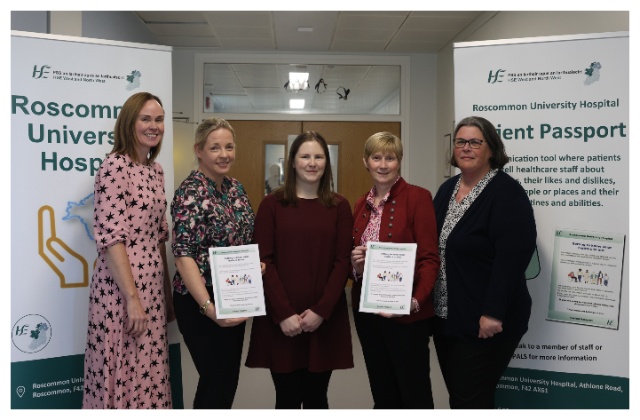![]()
You are here
Roscommon University Hospital Launches New Patient Communications Passport to Support Person-Centred Care

Roscommon University Hospital (RUH) is delighted to introduce the new Universal Patient Communications Passport, “Getting to Know What Matters to Me.”
The Patient Communications Passport is designed to reduce communication barriers and enhance the overall healthcare experience. It can be used by any patient accessing healthcare services who wishes to share personal preferences and important information with staff.
The passport allows patients and families to record details such as personal history, likes and dislikes, significant people or places, normal routines, and any specific supports they may require in a healthcare setting. Patients can complete the passport at home and bring it with them to hospital or to any healthcare facility.
This resource is especially valuable when a patient is transitioning between care settings and meeting new staff members. The passport travels with the patient and can be used during any episode of care. National and international research shows that admission to an acute hospital can be distressing and disorientating, and is often linked with increased anxiety. By supporting personalised communication, the passport helps reduce that stress and creates a more positive care experience.
The Hospital Patient Experience and Patient Council identified a need to improve communication with patients and families about social needs, and to support a more holistic, person-centred approach to care for all patients attending Roscommon University Hospital. The Patient Communications Passport was co-designed and peer-reviewed by patients, staff, and key community organisations including the Dementia Advisor for the Alzheimer’s Society of Ireland, the Easy Read Roscommon Group, the Age Friendly Hospital Steering Group, and members of the Patient Council. This strong interagency collaboration ensured the passport is inclusive, user-friendly, and accessible for all.
Speaking about the new initiative, Paula Noone, Assistant Director of Nursing, Dementia Quality Improvement, HSE West and North West, said: “The passport immediately indicates whether a patient has any communication difficulties or may require additional support. It allows healthcare staff to quickly identify critical information that may otherwise be hard to obtain, and helps them understand how to effectively engage with the patient.
“We want to make sure that all our patients are as comfortable as possible in a healthcare setting, and the passport is another tool to assist with that.”
Christine Rohan, Patient Advice and Liaison Service (PALS) Coordinator at Roscommon University Hospital, added: “This resource will help staff to understand the memories, habits, routines, and symbols that matter to each person. We want patients in RUH to have an inclusive, person-centred care experience. The Patient Passport helps to break down communication barriers and empowers patients and families to be active participants in their healthcare journey.”
Marie Doorly, Interim Hospital Manager said: “This initiative promotes person-centred, compassionate, and integrated care, while supporting the delivery of safer healthcare. Having greater supports in place, such as the passport, will greatly enhance the care we provide to patients who face communication challenges. Ensuring we have processes that meet the needs of our patients is a key priority for the hospital.”
The article above is specific to the following Saolta hospitals::
Roscommon University Hospital (RUH)
Keywords:
